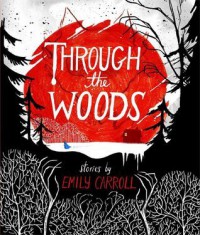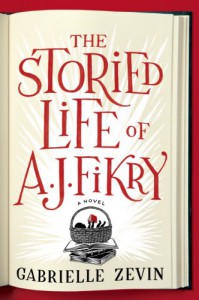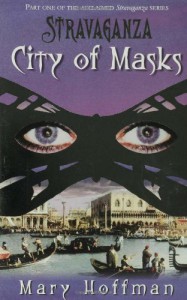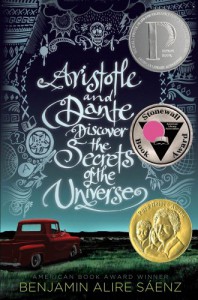Book Review: Everything, Everything by Nicola Yoon


Can we start with the cover art? Because wow. It is illustrated by the folks over at Good Wives and Warriors, and you should click on over to their website if you’re at all interested in detailed, vibrant art. Honestly, the cover art is so intricate that it’s breathtaking. I seriously want a poster of this book cover to hang on my wall and stare at all the time. Anyone got the hookup? Major heart eyes for the jacket design that encases and displays this book to the world.
I read this book cover to cover in an estimated 4 hours. Those five hours were not spread out over time. I read this book in two sittings. It would have taken me a lot longer if this was a text-heavy book, but Yoon incorporates instant messaging, drawings from Maddy’s journal, and renderings of official documents into her short chapters. Short chapters are such a trap for me. I’ll see the end of the chapter and keep thinking “I totally have time for one more!” And then I look back three hours later, and that one more chapter has turned into . . . well, most of the book. Short chapters keep me turning the pages, as does the use of mixed media, so Everything, Everything was perfect for quick reading.
Maddy – the protagonist – has a voice that is so compelling and full of life. She hasn’t been Outside her house since she was a baby, but she spends lots of time learning about what life on the Outside is like. The thing about learning the world’s history? Most of the events that are in the textbooks probably happened Outside of Maddy’s house.
The whole book had a fairy tale atmosphere. You know, it’s kind of like the cozy cottage secluded in the woods. You know the person inside – the dwarves, long-lost princesses, and/or enchanted woodland creatures – is about to have their world rocked. Maddy, our book’s princess(-like figure) feels safe in her home, and has a mother who cares for her very much – what more could she need? Things get complicated when Ollie moves in and for the first time Maddy begins to keep secrets from her mother. And just in case you were wondering, even though fairy tales are not exactly known for subverting sexist character tropes, Maddy is no damsel-in-distress here. Well, maybe she kinda is at the beginning . . . but the reader soon finds that she is a stubbornly independent and courageous young woman. 50 brownie points if you can guess which fairy tale this book turns into before you get half way through!
I’ll admit, I had guessed what fairy tale Maddy’s story was turning into, but the end was still shocking for me. I knew the basic outline that the plot should follow, but Nicola Yoon plays with that formula and opens it up for contemplation. You finish the book wondering who (or what) the bad guy is in Everything, Everything.
Maddy was extremely relatable to me because first of all, she loves books, and will defend their importance in the world if someone challenges it. Books are how she knows anything about Outside. They’re how she escapes the confines of her medical prison. Some mentioned more than once: The Little Prince,and Jane Eyre. I find this so fascinating. One of the questions that crossed my mind as I was reading and had these titles in the back of my brain was whether Maddy was this story’s Jane Eyre or if she was destined to become the madwoman in the attic. I’m not going to give away the ending, but comparing Maddy’s story to that of Jane Eyre is extremely thought provoking.
Everything, Everything is serious business. It deals with topics such as child abuse, emotional manipulation, and mental disorders, so if any of those might be triggers for you, read with caution. However, it’s also a teen romance. I kept thinking back to the days when I used to read Sarah Dessen voraciously and frequently. The love story is so genuine to teenage romances. Especially when Maddy is scrutinizing Ollie’s IMs to try to squeeze out every ounce of meaning. The mysterious “Hey.” turns out to have a multitude of possible interpretations.
I can’t speak for everyone, but I think that a lot of people will like Everything, Everything a lot. You should Definitely, Definitely read this book!
Book Review: Boy, Snow, Bird by Helen Oyeyemi
This is an excerpt. Click here for the full review.

I have mixed feelings about Boy, Snow, Bird. But I do have to say that my opinion sways heavily toward the positive! I’ve never read anything by Oyeyemi before, though Mr Fox has been on my book depository wishlist for a while now, and I found her writing style to mesh really well with my tastes.
That’s a little bit of a weird thing to say, and I realize that. I’ll say it in a different way that might be more relatable: this book definitely had the potential to become one of my favorites. I really thought that’s where it was heading – Oyeyemi really knows how to write.
Boy, Snow, Bird is, among other things, a historical narrative that deeply explores race, discrimination, and passing. These elements also help solidify the book’s connections to the Snow White fairy tale. The beginning of the book is narrated by a blonde white woman named Boy, so these elements of the plot are introduced with a light emphasis through her, but they become a huge focus later on. I thought this was an interesting way to draw in the common reader, who may not have picked up this book if it were marketed differently.
Through Boy, the reader develops empathy and then when her life gets tangled in racial discourse, there’s more outrage than would have been there with a POC narrator.
Book Review: Through the Woods by Emily Carroll

Title: Through the Woods
Author: Emily Carroll
Publisher: Margaret K. McElderry Books
Pages:208
Pub date: July 5, 2014
Format: Hardcover
Source: Purchased
Synopsis: ‘It came from the woods. Most strange things do.’
Five mysterious, spine-tingling stories follow journeys into (and out of?) the eerie abyss. These chilling tales spring from the macabre imagination of acclaimed and award-winning comic creator Emily Carroll.
Come take a walk in the woods and see what awaits you there…
Review:
Oh, Emily Carroll. Where should I begin? The 5 short stories that make up this collection are downright creepy. They’re Freudian Uncanny. They’re disturbing. Tim Burton unfiltered, if he were a woman. Think Corpse Bride but with more blood. That being said, I really enjoyed reading them. Sometimes feeling a shiver down your spine is exactly the right reaction.
Physical Books: Old-Fashioned but Sacred
In which I take a look at Alix Christie's article on The Millions and talk about my love for books
Hausfrau: A Novel
 this is an excerpt from my full review at The Fault in Our Blogs
this is an excerpt from my full review at The Fault in Our BlogsFirst of all, the synopsis calls Anna the “heroine.” I’m not sure I would call her that. She’s clearly the protagonist and narrator of Hausfrau, but her moral code is so twisted that I think she’d be more of an anti-heroine. What I liked about her though is how self-aware she is. Anna has a reason for every action, and a thought process she never lets anyone – not even her psychoanalyst – in on.
One of the things I most appreciate in Hausfrau is Essbaum’s playful use of language. Anna is learning a new language (after 9 years of scraping by with only English) and these German classes dig deep and analyze the similarities between grammar and life. It sounds like a weird connection, but it really becomes a tool for uncovering the ideologies behind grammar rules. Grammar reflects the way we organize life. Anna seems to make these connections with ease, and boy does she have a knack for wordplay and puns.
... read the rest by clicking the link above!
The Storied Life of A.J. Fikry
 This is an excerpt. The full review is posted here on my blog.
This is an excerpt. The full review is posted here on my blog.I remember when Zevin’s novel Elsewhere came out. I was somewhere in my gradeschool years, and Elsewhere was one of the hyped new releases that our librarian featured in a book talk. This was in 2007 – over 7 years ago – and I still find myself thinking about it from time to time. When her next book came out, I made sure to read it and enjoyed that one too, but I didn’t keep up with her releases after that.
Somehow, The Storied Life of A.J. Finkry popped up on my radar, and I was intrigued by all of the great reviews it has on goodreads. I also just wanted to see how my 7th grade self’s favorite author was doing. This was a book I kept putting into a shopping cart, then after surveying my other purchases, putting back on its shelf to buy another time. Well, when I was at BookPeople this weekend, I came across AJ Finkry because it was a featured title with a generous recommendation.
City of Masks
 I remember really, really enjoying this book when I first read it at age 12. It kind of blew my mind, and I was so excited that I recommended it to a couple of friends.... who started to read but quickly came to the conclusion that this was an awful book, and they told me so. It was a little scarring. I gave away my copy years ago, but this is one that I want to revisit to see if it holds up across the age span.
I remember really, really enjoying this book when I first read it at age 12. It kind of blew my mind, and I was so excited that I recommended it to a couple of friends.... who started to read but quickly came to the conclusion that this was an awful book, and they told me so. It was a little scarring. I gave away my copy years ago, but this is one that I want to revisit to see if it holds up across the age span.http://www.thefaultinourblogs.blogspot.com
Invisible Monsters
 http://thefaultinourblogs.blogspot.com
http://thefaultinourblogs.blogspot.comSo messed up. A commentary of physical beauty, the shallowness of modeling professions and culture, family, and consumerism. It was very hard to like the protagonist in this one, which was why it was difficult for me to read. In addition, Palahnuik's narrative arc is one that sprinkles explanations through the course of events, leaving the reader in confusion until the "reveals" at the end. It was a little frustrating for me. I just didn't know what was going on. That being said, I can see why so many people love this book. It is astoundingly well done. That doesn't mean, however, that it's pretty. Invisible Monsters really freaked me out, which is probably what it was supposed to do. I just can't say it was fun to read.
If I Stay
 http://thefaultinourblogs.blogspot.com
http://thefaultinourblogs.blogspot.comAlright I have to admit that I went into this book with an assumption, and was completely off the mark. We saw a clip from the movie adaptation at LeakyCon, and somehow I grabbed the idea that the story was going to revolve around a purgatory-esque place, and have a romance within it. Basically I was expecting a book about afterlife or inbetweenlife but that's not what this book was about. It's about life.
If I Stay is told in alternating sections of present and past events. The two complement each other and build tension, and maybe it's because I had just finished More Than This by Patrick Ness, but I kept expecting another person to show up in the 'present' story. It just seemed so lonely. However, I did enjoy the characters. There was a punk crowd (with briefly mentioned lesbians in a pink car!) that encouraged many cool references to rockers. The Kathleen Hanna ref made my day.
Family life was brilliantly depicted, especially the musical differences within. And props for acknowledging diversity within Jewish cultures. My favorite aspect of continuity in this book was the classical music. I was heavily involved in music when I was in high school, so I know how dominating the discourse and activities can be on a person's worldview, especially when they enjoy it so much. Every time I saw a music metaphor or term, I smiled a little smile because of how real that made the main character. Also, Shostakovich was mentioned more than a few times, which brought out my inner nerd. The cello is my favorite instrument, so I really loved all of the stories involving it. I did find it super interesting though, that the main character, Mia, had never played in a group setting until she went to summer camp. Just goes to show that everyone learns differently, and great musicians can come from many different places, including a post-punk household.
The Walls Around Us
 Original location of this review, including review in video form
Original location of this review, including review in video formvideo review here!
I don't even know where to begin in order to do this book justice, you guys. It's freaking good, in all the ways you would expect it to be and more.
This book comes out on March 24, 2015
(amazon kindle is offering the first seven chapters for FREE right now! See, now there's no good excuse not to check out this title after you read my review.)
So most of the plot takes place in a juvenile detention center for young women, narrated by Amber, an inmate. In between chapters, we switch to Vee's narrative, a competitive ballet dancer getting ready to head to Julliard to study her craft. And Vee's former best friend Ovi becomes the connecting fiber between the two locations when she enters the detention center after a horrific incident with Vee - an incident we know almost nothing about, except vaguely that someone ended up in jail.
If you think that sounds interesting, just wait - or if you don't, just wait - because guess what? Weird paranormal things happen occasionally. What is going on? No one seems to know, but they're busy thinking about other things anyway, like all the secrets they're keeping deep, deep, down inside.
Much like in the Netflix original series Orange is the New Black, the dynamics among the inmates was so powerful. Granted, the girls all go through the crying period when they first arrive, and they all have more than enough reason to be bitter about their sentences, or a little indignant towards the power-abusing guards. (sound familiar, OitNB fans?) These things bring them together, but it goes much deeper than that. Secret messages, the desire to run away from all that they're going through, the girls seem to genuinely attempt to understand each other. The dynamic here is most consistently reflected by Amber's narration. I noticed that she never says "the others and I" or "the girls and I," to Amber it's always "we" thought this, that thing happened to "us." It caught my eye because I don't know if I've ever seen a protagonist so immersed in the community she feels.
This novel is suspenseful. It's horrifying. It's HEAVILY psychological. It's fast paced, but you'll wish it was longer. I could keep going, but you get the point... it's intricate.
I'd recommend this book to anyone who enjoys reading YA lit, stories about ballet or fine arts, crime novels, or paranormal thrillers. Also just anyone who wants to read a good book. I knocked this one out in just over 24 hours. I'm really pumped to watch this book succeed after it's released!
Siege and Storm (Grisha Trilogy (Shadow and Bone))
 original source is my blog
original source is my blogLet me start out by saying that I am now 100%, fully into this series. That's not something that comes easily to me. I tend to steer clear of multiple-work series because a) I probably won't keep up with them as they come out because I just don't have the time or energy to commit myself to every first-in-a-series that I read, and b) I never want to dethrone Harry Potter from its pedestal (and now that I think about it, HP might be a contributing factor to why I don't read much fantasy). For the Grisha books, I am anxiously awaiting the advent of the concluding book in paperback form - I'd like to have at least one series with matching editions to pretty up my bookshelf. I'm vain like that. For someone who is offput by time investment required to read all series, I sure own and read a lot of them.
Siege and Storm is the sequel to Shadow and Bone, set in a world where magical elements can be manipulated and ultimately used as weapons as well as to better the world. With a strong minded and realistically imperfect narrator, Siege and Storm flows naturally and is what I would classify as an easy read. I mentioned before that the premise reminds me of Avatar: the Last Airbender? That still holds true - even more so now. I was astounded at how moving and relatable it was to read about the Alina apart at the seams. This seems like a common way to take the plot in the middle of a series, and it's left me hanging off the edge of my seat for more. The thing about reading from Alina's point of view is that you're constantly thinking, "Alina! Don't do that thing! You know you're not supposed to, and you know nothing good can come from it!" while also knowing that she's going to do it anyway. Like I said, stubborn. Very enjoyable and richly detailed series that fans of A:tLA and Maggie Stiefvater-like stories will enjoy.
We Are Not Ourselves
 original source of my review
original source of my reviewWe Are Not Ourselves is "an epic of small events," David L. Ulin of the LA Times writes. "By that I don't mean its story is insignificant but quotidian: the particular struggles of the day-to-day."
This book, in short, is a middle class assimilation story. Eileen Tumulty has had an unfortunate childhood, forced into the role of caretaker by her alcoholic parents. All she wants is to get out, get married, and leave all that behind her. Soon, she meets Ed and they settle down together, but Eileen's hunger for the good life is not satisfied. She finds herself always yearning for a more lavish lifestyle, while Ed insists on a modest one.
Warning: this book is sad. It is very sad. It was difficult to read the last 33% of the pages, but the plot was just engaging enough that I couldn't just give up. I owed it to the full characters, the decadent but somehow concise prose, the overall craftsmanship of the novel to finish, and I'm glad I did. I came away with the feeling that We Are Not Ourselves is more than just a powerful story, it's an important story that needed to be told, no matter how sad. If reading it made me uncomfortable, then I was supposed to be. There are different types of sad, though. There's good-sad, which leaves the reader with a happy aftertaste, and there's sad-sad, which is kind of depressing and kind of beautiful at the same time. This is the second kind of sad.
Thomas switches between narratives to tell the story, but uses mostly Eileen's voice, and never Ed's, which was a small bit frustrating because we never get to see what's going on in his mind, what he's thinking, his rationalization behind certain actions. That is how Eileen was feeling as well, so the choice adds a layer of sympathy. It also takes place over the course of an entire generation. The pacing is unconventional though, and skims over years at a time to focus on key moments in Eileen's family life. I was happy to find that it takes place in and around Manhattan.
Looking back, I can see the events in the novel with more clarity. While I was reading, everything seemed like the Worst Thing Ever. I do have a tip for readers who want to take on Thomas:
Go back and read the one-page prologue after you finish the book.
Things I didn't like:
I'm not going to be all praise. I had some deeply fundamental problems with We Are Not Ourselves. One of them is Eileen. Poor, ignorant Eileen- she seems to be under the impression that if she can just have a nice picket fence house, that she will be happy. Why does she think this? I do not know. Sure, she worked her way up from a working class home, eyes on the American Dream. But once she breaks through into the middle class, and finds a partner who actually lives up to her impossibly high standards, she is never content. The more Eileen reached for a nice home and stable job, the more frustrated I got, to the point where, in the last few sections, I could not sympathize with her anymore.
The other, bigger problem I have is with Thomas's depiction of the younger generation. Alright, time to crack my knuckles and get down to it. I am 20 years old. I am in college, and heavily reliant on my family for monetary support. (Yeah, I said it!) Want to know why? I am entirely, 100% sure that at the level of quality education my university offers, I cannot hold down a job in addition to being a full-time student. Student life is hard enough, and I barely find a way to get by as it is. My mental health is a very fragile thing, as several of my professors can attest to.
Now here's how Matthew Thomas describes young adolescents, the group as a whole: ungrateful, "entitled." "This younger generation has no respect." Irresponsible, unable to give anything up for what is morally right. Especially Connell, who knows that what he's doing is the wrong thing, but he's just too damn stubborn to stoop down and help out. This, frankly, is utter crap. Considering just last weekend was the Project for Awesome, where hundreds of young adults advocated for and participated in activist movements, I know that there is so much good in my peers. We can - we have made a difference for the positive. It makes me so sad to see this book filled with so much condescension. Yeah, we're pretentious little shits. I get that. But we're not bad people, and we do know right from wrong. It's not like, after the age of 30, you suddenly stop making mistakes. It's just that the mistakes you make in your 20s have a greater impact for some reason.
Mr. Kiss and Tell
 Minor spoilery content is inevitable when reviewing this book
Minor spoilery content is inevitable when reviewing this bookYou can also read this review on my blog.
She's back! Marshmallows, rejoice! Get ready to indulge in some classic Neptune dirt. I'll admit that I had my doubts going into this book. I was disappointed with the first Veronica novel, so I really had to cross my fingers when I started this. Well, there must be something in the air for sequel writers this year, because this was another supremely executed sequel. If you've read the first Veronica... You're probably shaking your head in disbelief. Trust me, I didn't believe it at first either, but Rob Thomas really pulls this one off. Glad to see that he and Jennifer Graham actually took the last book's criticism into account. And also bought a thesaurus.
The first and most welcome change was the inclusion of characters who took the margin in TDTL. I love the new narrative structure that switches perspectives every few chapters, even if the subplots kind of teeter out and bypass resolution at the end. Keith's storyline was great; I'm glad he didn't spend too long being moody over Veronica, because that would have killed it. Weevil actually gets portrayed as more than just a plot device! Logan is back in Neptune! Mac gets really into the case. And Wallace... well, he's in the book.
Call me a sucker, but oh how I love the puppy. Yes, include a puppy in your novel to steal the readers' hearts. It works. Seeing everyone's interactions with the puppy was interesting too. However, when people say puppies are high maintenance, they mean it. Veronica is zipping all around town and poor puppy is probably being shuffled from person to person and totally confused and whiny...
Veronica's thoughts - like literally, her thoughts in italics - were much more practically used than in TDTL. I didn't have the same problem of getting lost between dialogue and thought process and written notes, which I know is just a small thing, but the story flows so much better if you can actually follow what is happening.
Thomas and Graham absolutely lock in on Veronica's voice and don't let go. At a point near the end, I stopped and realized that even though the text is in third person, I was reading it in my head Veronica-voice-over style. That's how authentic it comes across. And my hat is off to the writers for balancing her successes and failures: because yes, Veronica does screw up sometimes, especially on opinions. She's stubborn as hell and sometimes that clouds her judgment, but I know that it's hard as a writer to include character faults without annoying the reader.
Mad props to Thomas and Graham for taking on a tough topic again. Writing about rape is choppy waters a lot of the time, and disastrous if done wrong. Veronica has a relevant backstory, and that raises the value of her opinion, which I thought exuded adequate but slightly flawed feminism. Very Veronica.
As far as things I didn't like, only two come to mind. The first has to do with Veronica's friendship with Max after Logan leaves, and it's more of a warning than a complaint. I'm glad that V didn't betray Logan by hooking up with Max (I'm talking about the celebration scene at the end). That would have been out of character for her and wouldn't make sense. I did feel the storyline leaning that way, though, which concerns me because it happens way too often that writers, screenwriters, playwrights, whatever will push a couple together for the sake of plot (My main objection to the movie Now You See Me). I do not want this to happen in VMars, and I'm glad it has not so far. There was a moment of dread at the end though, for which the tension was set up nicely and everything, where I got prematurely angry at the book because I thought... You get the point here. The next book better be careful about this.
The other thing is kind of minor. I found myself wondering throughout the book, as someone living on a budget, how Veronica was paying for all this stuff. I mean, obviously the apartment or house or w/e I assume that Logan is paying for, but she flat out takes off for Vegas and books a fancy hotel room. I just don't see how she could afford that and the puppy if she's working a non-paid case, especially if her father is still disapproving of her career choices for money reasons.
All in all, a great read. I will encourage everyone I know to pick this up when it comes out. I will probably even buy a copy for my bookshelf because it might be a good re-read one day. I'm interested to see how this "series" progresses. Kiss and Tell takes place 6 months after TDTL ends, so depending on how many books the series plans to churn out, the next book will really set the pace.
The Mime Order
 original location of this review
original location of this reviewAfter reading The Bone Season, I wrote, "I might even go in for the second one." Boy, am I glad that I did. If I had any doubts about this emerging series, they have been calmed completely by The Mime Order. Samantha Shannon continues Paige's narrative in what is sure to become an epic saga. I can already picture the books all lined up on my shelf, and it's very lovely.
So, the cool thing about Mime Order is that it gives the reader an in depth view of the political system that I had so many unanswered questions about when I finished the first book. The detail included in the many layers of Paige's world was absolutely stunning. I found myself thinking of the Harry Potter series and the complexities within its world, and it's possible that the two are on about the same level.
And oh, the villains. They're written so that we love to hate them, though distinctions are complicated as the plot drives on. Betrayals are, understandably, common in Mime Order. There are so, so many loathsome characters that emerge here. At points, the enemies have the story at a stalemate - very frustrating and suspenseful for the reader, but Paige always finds a way to get things going again. She's very resourceful that way.
The ending had me immediately asking questions, which is what a good ending should do. I also felt a sense of closure as the final events unfolded and that very last line got a "You've got to be kidding me" yelled aloud to my empty living room. Really though, should have seen that coming, it makes sense. Never liked him anyway, so I'm glad that I don't have to try to like him anymore. I will be interested to see where the next book goes. It doesn't seem like Paige is going to be making progress any time soon.
Aristotle and Dante Discover the Secrets of the Universe
 This review can also be found here
This review can also be found hereOkay, this book kind of knocked me out. It's a quick read, and the plot is simple enough, but don't let that fool you or deter you. Ari and Dante packs a mean punch. About halfway through this book, I was just so filled with happiness - it's a difficult emotion to describe, how I felt. I distinctly remember thinking that the ending was going to absolutely wreck me. I was ready for devastation and emotional distress. When I turned the last page though, everything was quiet and still in my mind.
Reading this book felt like the characters were reaching out and hugging me.
Ari and Dante are both so real, and their feelings are so genuinely... adolescent. I can't say for sure, but if I had read this book when I was fifteen, my life probably would have panned out differently. That's how much I was drawn to Aristotle's narrative - it captures high school life in a skillfully honest way that is incredibly rare and difficult to find. I don't have much else to say about this one, besides READ IT. Read it, and you'll see. My own words fail to sum up my reading experience, but Saenz really wrote the hell outta this one. Will be read over and over again.
The Book of Lost Things
 originally posted here
originally posted hereThe premises for this story are incredible. The setup takes place in England during the second World War. The young protagonist, David, is struggling to find his place in a changing family. He finds solace in the stories he once shared with his mother, and leans on his books to keep himself stable. Then the books start whispering to him, and soon the books take him on a journey far away from his home. The novel then takes on an episodic form, as David fights one monster after another. I really enjoyed this book. One third of the way through, I was so excited for the story to unfold, I could hardly contain myself.
The beginning was everything I expected it to be. I set my hopes so very very high that I'm sure no book could possibly live up to them. In a kind of alarming way, the gruesome details in some violent and graphic parts were pretty cool. These moments grounded the theme as something much more grown up than a children's book. David goes from a world troubled with war to one on the verge of it. He is forced into situations far beyond what a child should have to handle. Halfway through, I just kinda got tired of the episode-by-episode-ness. I found the end lacking resolution. That's just my opinion, though. I would have really liked to see a reunion scene instead of a summary to wrap it all up. I do of course understand that it was invoking a storybook-style ending, which was fitting. The Book of Lost Things is a tribute to fairytales, stories, and the lessons that young readers can pull from them.





